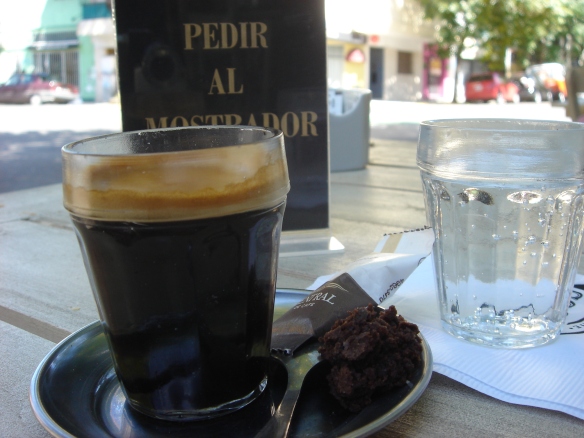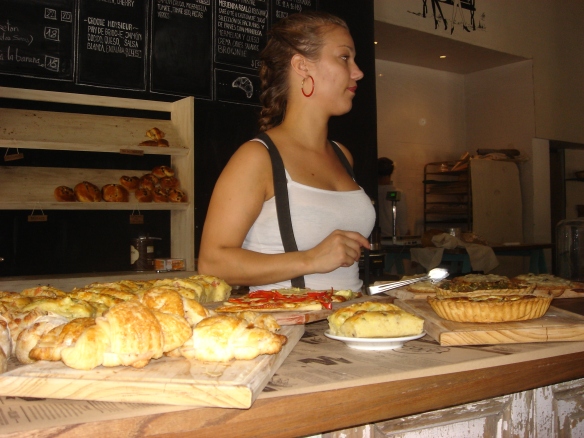A common theme in the UK is the “problem” of immigration. Here I live in a city that is almost entirely immigrant. I know few families that can trace their Argentine roots back more than two or three generations. It’s made me realise the problem is not immigration, it’s integration and ask myself how the Porteños developed their own collective identity so quickly?
Maybe this wasn’t so difficult. After all they were mainly European, mainly Christian, mainly looking for a better life in a new home. While my girlfriend’s Italian grandfather habitually went to sip coffee with a large group from his region and converse in his native language, her father never did. In fact the speed Italians gave up speaking their own language is impressive and conflicts with their image as proud and nationalistic. Perhaps it’s an indication of how comfortable they felt as second generation immigrants. It was already their country. And the interestingly Italianized porteño dialect of spanish with its lunfardo slang, was now their language.
But integration has its downsides too. Things get lost. When did the Italians give up their love of crispy, tomato sauce smothered pizza and decide to settle on a doughy, cheese drowned compromise? When did the Spanish decide that the venerable chilli might offend some of their new countrymen and eliminate it from their cooking? When did the French decide their sauces might be too challenging or their baguettes too crispy. And most importantly, who decided that strong flavourful coffee might have too much character to appeal to everyone?
Luckily, as a new immigrant, I’m hitting the city at a time of change. On my frequent visits I would scour the streets for Segafredo or Illy coffee signs. Even then, good product and good equipment didn’t guarantee good coffee. Maybe Nespresso changed things? Idiot-proof but expensive capsules, heavily promoted, awakening some ancestral memory? But what is really driving the change is new immigrants, ones with defined ideas about quality, authenticity, modernity or whatever passion drives them, arriving to find a city that is eagerly searching for a little more diversity.
Buenos Aires is once again somewhere where you can not only go for a coffee, you can go FOR the coffee. So to my favourites:
COCU
Cocu (Malabia and Gorriti) in French, means Cornudo in Spanish, Cuckold in English. A brave choice in a country where you can make intimate reference to the disreputable career of someone’s mother and suggest their progeny make a rapid return to the original orifice from which they first emerged, without said progeny turning a hair. Suggest their wife so much as looked as another man?? Fireworks! Deadly vendetta? Maybe the name refers to the love of food overriding such petty matters? Can one be cuckolded by a pain au chocolat?
The place is already a French colony. There are always so many French people present that they can’t all work there. Even speaking Spanish their accents are cute. Who knew that BA was so Francophile. And they are not the skinny, irritating, we-are-all-models, stereotype Parisian, type of French. They are pretty, voluptuous, sexy types…
Or unusually tall good looking types, with their hands deep in fistfuls of dough, swelled by some rare strain of yeast, passed down secretly through generations of their family.
 And they make coffee that looks AND tastes like this so, todo bien! No need for further explanation, though I recommend a pain au chocolat on the side.
And they make coffee that looks AND tastes like this so, todo bien! No need for further explanation, though I recommend a pain au chocolat on the side.
 As it says on the sign, you have to order at the counter. Self service in BA? Will it ever catch on? Judging by how busy it was, and how empty the speciality coffee house across the road wasn’t, it already has!
As it says on the sign, you have to order at the counter. Self service in BA? Will it ever catch on? Judging by how busy it was, and how empty the speciality coffee house across the road wasn’t, it already has!
In Boca al Lupo (Bonpland 1965), literally in the wolf’s mouth, is the equivalent of saying “break a leg” in English, a wish for you to have good luck.
So Enrico is another new immigrant, Italian this time, but with “ganas” to show off the best of Italian bread and desert making to go along with his excellent coffee. The place is a bit more comfortable. A beautiful building sympathetically converted. I suspect he had a bigger start-up budget and it shows, though the same love is also evident. He works with the illy brand and there is nothing wrong with that, as long as you know how to work the monster machine.
Enrico (pictured) clearly does. He used to work for illy and the machine is the Rolls Royce of coffee makers. A lighter, creamier bru than Cocu, a place to go for mid-afternoon coffee with a bit of cheesecake rather than heart starting black vitamins with croisant. The bakery out back is visible to all and well equipped and produces a wide range of artesanal breads. He gave me a big baguette to take away and try later. My bread making instructor (God bless him, he failed me in Panadaria 1 for not having a consistent crumb within my baguette – strong crust and holy air dont cut it here – obviously it didn’t help when I asked whether he had ever been to France), claimed you can’t keep bread crusty here due to the humidity. I warmed Alberto’s for 2 minutes in the oven. Crisp and light.
By the way, I may be doing Enrico a disservice just focussing on bread and coffee. There is lot’s more on the menu but I haven’t tried it yet. Also if he sends you off with a hearty, “in boca al lupo”, the correct reply is “crepi”. If you simply say grazie you are meant to have bad luck.
The Colombians are coming!
Well in fact they have already arrived. Colombian coffee enthusiasts opened the Full City Coffee House in Chacarita over a year ago. Unfortunately, other than communing with the dead in its amazing cemetery (far more interesting than Recoleta’s señor tourist) there is not much I go to Chacarita for, so I haven’t been there. But you can read the review here, http://pickupthefork.com/2012/05/12/full-city-coffee-house-real-coffee-has-finally-arrived/ . Where I have been, frequently, is to Coffee Town. It’s a small hut in the centre of the wonderful San Telmo covered market (Defensa and Estados Unidos – like the train stations it was built by the Brits) where you can encounter a cornucopia of veggie sellers, butchers (look out for hanging ham bones to flavour your beans), granjas (the chicken guys) and a variety of other speciality stands including a guy who sells very good quality herbs and spices and an almacen with some excellent hams and cheeses. What could be better than to start and finish your shopping trip with a top quality coffee. No wonder supermarkets will never catch on!
(In the interest of imparting a my guests with a greater level of knowledge I will once again refer to a more extensive post by my fellow blogger; http://pickupthefork.com/2012/12/19/the-great-san-telmo-coffee-hut-coffee-town/. And no, it’s not that I’m trying to endear myself to her, I don’t have a schoolboy crush. In fact I have never met her. And “ojo” as we say here, pointing to our eye in a warning fashion, I only recommend the coffee. I haven’t tried the rest.)
Le Pain Quotidien.
This one hurts me to recommend. It’s a global chain, stores in 17 countries, a Mc Burger King Something of bread and coffee. It’s probably a Starbucks structured tax avoider, siphoning off its profits through franchising royalties and dubious intellectual property payments, into some tax haven located somewhat to the left of Mars. I haven’t tried the new Palermo branch. There were too many people in it. Why? Because by all accounts it’s very good. Like it is in London or Brussels or the 15 other countries. So, some guy from Brussels said, uuugh, the bread’s horrible here, set up a bakery, did it properly, got some international tax advisors and now travels in a Lear jet. If he was a banker I would hate him, but who can hate a baker?
Back to immigrants. Just as they were the original building blocks of this delightful city, the new generation is going to be the salvation of its gastronomy. Yes, there were guys from here who did poorly paid internships at some fine European restaurants before retreating rapidly to their motherland but, with a few exceptions, learning to delicately shape potatoes did not enhance their taste buds. But Europe is in crisis now and Chefs never starve to death. They are hard working types. The interior of a busy kitchen isn’t so different anywhere in the world. Here, if they leave work at 2.00 a.m. at least they know they can get a drink. Or even dinner. Or party till midday. They will come and find miraculously that they can be a chef and still have a life. And Argentines are enthusiasts. If it’s good, they will follow you, support you, love you, at least until something better comes along. No, its not always easy to catch the zeitgeist, and Argentines need to have what they are going to love explained to them. But it does happen, as you can tell from the prevalence of Sushi in a city that doesn’t eat fish. And they love their immigrants, they even have a holiday to celebrate them.
So to all you new (like me) immigrants. In boca al lupe.
Crepi il lupo!
Thanks





